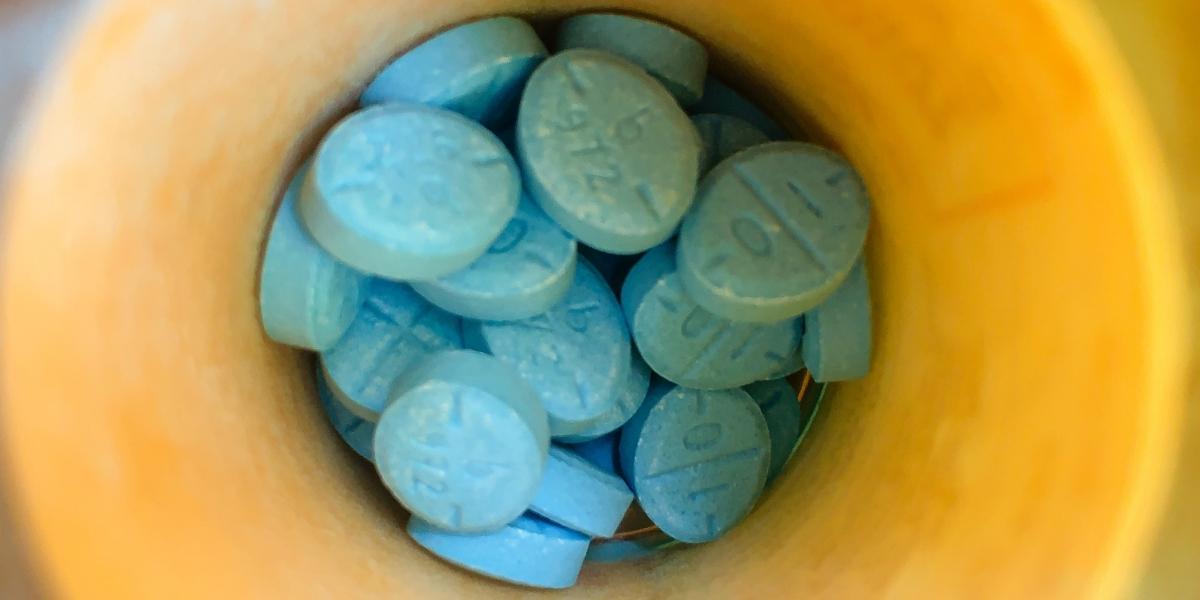Adderall Addiction and Abuse

In the United States, Adderall is one of the most prescribed medications, quickly making it’s addiction more common.
Often called a “study drug” or “smart drug,” people take Adderall to help them focus, improve their memory, and stay awake and more alert.
Other people take it to suppress their appetite and lose weight, and some people abuse Adderall for its stimulant effects which can be similar to cocaine or meth.
According to several studies, Adderall abuse and addiction are most common in young adults, especially high school and college students.
The Food and Drug Administration (FDA) approved Adderall to treat attention deficit hyperactivity disorder (ADHD) and narcolepsy.
Interestingly, the National Institutes of Health (NIH) notes that Adderall is more effective in treating ADHD because it helps behaviors like fidgeting and hyperactivity, instead of the misconception that it boosts mental performance.
What Is Adderall?
Adderall is a prescription medication used to treat attention deficit hyperactivity disorder (ADHD) and narcolepsy.
Adderall is the name brand for the combination of amphetamine and dextroamphetamine.
Both are central nervous system stimulants that interact with the body and the chemicals in the brain.
When used properly under medical supervision, prescription stimulants like Adderall can be safe and effective.
However, the potential for dependence increases with regular medication use; even people who follow medical advice can develop an addiction to Adderall.
There is a high potential for abuse when taken recreationally, without a prescription, or in dangerous ways like snorting or injecting it.
What Does Adderall Do?
Adderall helps regulate moods, increase attention spans, and decreases restlessness when taken as directed for ADHD.
People prescribed Adderall for narcolepsy take it to stay awake and alert throughout the day.
Adderall helps the brain and body produce norepinephrine. Norepinephrine is a hormone and neurotransmitter that increases memory and alertness and helps the body regulate blood pressure, heart rate, and sleep signals.
Additionally, it increases and regulates dopamine in brain signals. It is commonly called the “feel good” chemical because it transmits dopamine in the brain, producing happiness, motivation, and satisfaction.
Any medication, prescription or non-prescription, can lead to abuse and addiction. Many people who abuse Adderall enjoy the stimulating effects and mistakenly believe it is safer than other uppers because it is a prescription drug.

Effects
Increased focus and motivation are the main effects of Adderall and the main reason people seek it out and become dependent on it.
Some people experience a loss of appetite when they take Adderall and abuse it to help with weight loss.
People who take drugs like Adderall, amphetamines, and other stimulants report feeling a rush of euphoria when they kick in. Other short-term side effects include:
- Increased heart rate
- Talkativeness
- Speaking rapidly
- Insomnia
- High blood pressure
- Dry mouth
- Headache
- Nausea
- Increased body temperature
- Irritability
- Mood swings
- Anxiety
- Sweating
- Diarrhea
Taking high doses of Adderall, even once, increases the risk of dangerous and adverse effects.
Snorting Adderall
Some people will snort Adderall to feel the effects quicker. However, snorting Adderall has its own set of risks and drastically increases the chance of an overdose.
Mixing Adderall and other drugs or alcohol can have adverse and dangerous side effects.
Adderall is a central nervous stimulant, and alcohol depresses the central nervous system; they tend to counteract each other, and users don’t feel the full effects of either drug, leading them to take more.
Therefore, combining this drug and alcohol can easily and quickly lead to alcohol poisoning and overdoses.
Long-Term Use
Long-term use, legal or not, of prescription stimulants like Adderall can have lasting side effects on physical and mental health.
Some of the long-term dangers of Adderall abuse include:
- Depression
- Anxiety
- Chronic migraines
- Extreme weight loss
- Kidney damage
- Liver damage
- Heart damage
- Memory loss
- Paranoia
- Twitching
- Seizures
- Addiction
- Withdrawal

How Long Does Adderall Stay in Your System?
The length of time Adderall stays in your body varies based on dose, how you ingested it, other drugs present in the body, and physical condition.
In addition, the body processes Adderall through the stomach, intestines, liver, and kidneys, so pre-existing health conditions can affect how long it stays in your system.
According to the Food and Drug Administration (FDA), a single dose of Adderall can stay in the system for two to three days, and urine tests can detect amphetamines within four to six hours.
Adderall comes in strengths from 5mg to 30mg; the higher the dose, the longer it stays in the body. And extended-release capsules will remain in the body longer when taken orally.
It takes the body about three days to eliminate one dose of Adderall. However, patients taking Adderall to treat ADHD and narcolepsy typically take it daily, which leads to a build-up in the body that will take longer to eliminate.
Snorting Adderall or injecting it will force it into the system faster, but it stays in your body for almost the same amount of time as taking it orally.
People who abuse Adderall by taking more than their recommended dose or taking it without a prescription will have more in their system and extend the time it takes for the body to metabolize it.
Is Adderall Addictive?
Adderall is very addictive, and because it affects the brain so strongly, it can quickly lead to addiction and substance use disorders.
The Drug Enforcement Administration (DEA) considers Adderall a Schedule II substance, which means it has a high potential for abuse and addiction, even when taken as prescribed.
Other Schedule II drugs include cocaine, methadone, and fentanyl.
The longer Adderall is abused, the higher the tolerance, leading to taking more potent and more frequent doses, seeking out other stimulants, or mixing medications for the same effect.
To safely treat people dependent on Adderall, professionals might recommend medical detox and other behavioral therapies to address addiction’s physical and mental aspects.
Addiction Symptoms
It can be challenging to recognize addiction to Adderall, especially in people who have a prescription for it.
Clinically speaking, you are dependent if you experience withdrawal symptoms when you stop taking a drug; and addicted if you continue to seek out and use the drug despite dangerous side effects.
Adderall abuse includes physical, psychological, and behavioral health effects. Some of the most common symptoms of Adderall abuse include:
- Visiting multiple doctors to get more prescriptions
- Hoarding prescriptions
- Snorting or injecting it
- Taking other people’s medications
- Panicking at the thought of not being able to get more
- Taking more than the recommended dose
- Depression
- Aggression
- Poor hygiene
- Panic attacks
- Anxiety
- Memory loss
- Insomnia
- Exhaustion
- Twitching
- Suicidal thoughts

Withdrawal
Withdrawal from Adderall can be difficult and dangerous because of how quickly the brain and the body become dependent on it.
The National Institute on Drug Abuse (NIDA) warns that people who regularly take or misuse stimulants and suddenly stop will experience withdrawal symptoms.
Withdrawal can differ for each person depending on the length and severity of the addiction. Some signs of Adderall withdrawal include:
- Trouble focusing
- Anxiety
- Difficulty remembering things
- Rapidly changing body temperature from hot to cold
- Sweating
- Fidgeting
- Restlessness
- Insomnia
- Exhaustion
- Mood swings
- Depression
- Decreased heart rate
- Migraines
- Seizures
- Breathing problems
- Heart attack
It is essential to talk to your doctor before quitting any medication. Most medical professionals will recommend medically assisted detox to help ensure the patient’s safety and decrease the likelihood of relapsing.
Adderall Addiction Treatment
Addiction to Adderall can be hard to overcome, but it is possible with evidence-based treatments and a team invested in your success.
At Northridge Addiction Treatment Center, our expert and compassionate team of medical staff, counselors, and therapists work with you to develop an individualized plan to get you on the road to recovery that will last a lifetime.
Quitting Adderall for people with ADHD or narcolepsy can present a unique challenge because the disorders still need to be addressed alongside the addiction.
NATC’s dual diagnosis or co-occurring disorder program is an evidence-based treatment. It addresses and treats mental health conditions such as ADHD and substance use disorders that co-exist.
We also integrate behavioral therapies such as cognitive-behavioral therapy (CBT) and support groups, amongst other proven treatments, to give you the tools and skills to handle challenges after recovery without resorting back to addiction.
Our residential treatment center gives you the space, comfort, and privacy to reset and take the first steps on the path to recovery and reclaiming your life. Reach out now to speak with a treatment specialist.
Find Meaningful Recovery
Our caring and compassionate specialists are eager to help you comfortably navigate this journey to recovery. Our individualized treatment plan, programs, and therapies may be a perfect match for you or your loved one. Let us assist you in living the happy life you deserve. It starts with a phone call.




